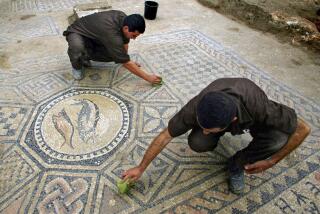Museum of Tolerance
- Share via
In your editorial (May 21), “The Line Is Thin--Too Thin,” regarding the proposed allocation of $5 million in state funds to the Simon Wiesenthal Center’s Museum of Tolerance, the issue of the separation of church and state was raised as the reason for The Times’ opposition to the funding method.
The Simon Wiesenthal Center is an academic rather than a religious institution. Leading constitutional scholars--including Alan Dershowitz, Harvard Law School; Jesse Choper, Berkeley School of Law; and William Cohen, Stanford Law School--have said that my SB 337 to allocate state money to the proposed Museum of Tolerance through the Simon Wiesenthal Center would not violate the church/state separation clause in either the U.S. or the California constitutions.
In addition to a formal opinion by the California legislative counsel that the appropriation in SB 337 would not violate the California Constitution, a number of decisions of the U.S. Supreme Court support this view as well (Tilton vs. Richardson, 1971, federal expenditures for building academic facilities for non-sectarian instruction by church-related colleges are constitutional; Roeiner vs. Board of Public Works, 1976, state non-categorical grants to religiously affiliated private colleges, with restriction that funds not be used for “sectarian purposes,” are constitutional.
Yeshiva University is an academic institution. And yes it is affiliated with a religious group. But it is not a theological seminary, and it does not ordain members of the clergy. While there certainly is a special relationship between Yeshiva University and the Wiesenthal Center, there are many examples of public funds helping private institutions.
For instance, state law provides for exemption of various nonprofit organizations from the sales tax on purchases or sales to private institutions. In addition, USC which has a school of religion on its premises and Stanford University among others sell tax-exempt revenue bonds to raise money for their support--with the accompanying reduction in interest rates due to the tax-exempt nature of the bonds.
Other instances of state involvement include the state’s reconstruction of the California missions--many of which are still used for religious services, and the State Scholarship Program, which allows deserving students to use state-funded scholarships to pursue studies at colleges that often have a religious affiliation.
The State of California has a duty to educate its citizens about the tragic consequences of prejudice, bigotry and hatred. The proposed museum will include not only information on the Holocaust, but also on other genocides such as the World War I era massacre of Armenians by Turks. Certainly the study of tolerance, human dignity, and what makes people hate is worthy of a state grant. The fact that some of the people most qualified to teach us are of one religious affiliation cannot be used to disqualify them from sharing their knowledge and concern with the rest of our society.
I have been joined by 79 of my colleagues in the Legislature as co-authors of SB 337. We hae a responsibility to educate and inform the generations to come about the horrors of prejudice and intolerance, and their consequences on society.
DAVID ROBERTI
President Pro Tempore
California Senate
More to Read
The biggest entertainment stories
Get our big stories about Hollywood, film, television, music, arts, culture and more right in your inbox as soon as they publish.
You may occasionally receive promotional content from the Los Angeles Times.










